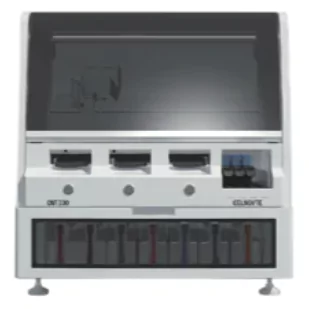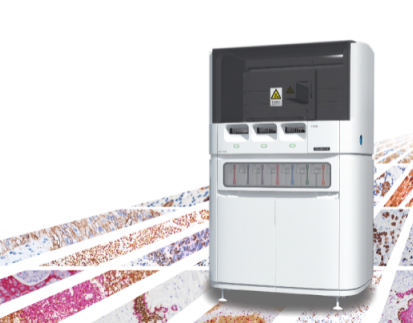Unlocking the Potential of the Full Automatic IHC Stainer in Research
2024-08-08
By admin
Understanding the Full Automatic IHC Stainer
Definition and Functionality
The Full Automatic IHC Stainer is a sophisticated laboratory instrument designed to automate the process of immunohistochemistry (IHC) staining. This technology plays a critical role in pathology, enabling detailed analysis and visualization of tissue samples. By utilizing antibodies to detect specific antigens within tissue sections, the Full Automatic IHC Stainer allows researchers and clinicians to diagnose diseases and understand complex biological processes more efficiently and accurately.
Advantages of Using the Full Automatic IHC Stainer
Enhanced Efficiency
One of the primary advantages of using the Full Automatic IHC Stainer is its ability to significantly enhance laboratory efficiency. Traditional manual staining methods can be time-consuming and labor-intensive, often requiring multiple technicians to prepare and process samples. In contrast, the Full Automatic IHC Stainer can handle high throughput, completing up to 60 samples in just 2.5 hours. This automation reduces the hands-on time required by staff, allowing them to focus on other critical tasks. Additionally, the consistent performance of the automated process helps streamline workflows, ensuring that laboratories can meet high demands with greater speed and reliability.
Improved Accuracy and Precision
Accuracy and precision are crucial in IHC staining for producing reliable and reproducible results. The Full Automatic IHC Stainer excels in this aspect by minimizing human error and variability inherent in manual staining procedures. With precise control over staining protocols and reagent dispensing, the device ensures consistent application of reagents across all samples. This enhanced precision is essential for achieving high-quality staining that is critical in the diagnostic interpretation of tissue samples. By standardizing the staining process, the Full Automatic IHC Stainer ensures that results are not only accurate but also reproducible, which is vital for both clinical diagnostics and research studies.
Cost Effectiveness
In addition to improving efficiency and accuracy, the Full Automatic IHC Stainer also offers cost-effective benefits to laboratories. While the initial investment in automated equipment may be substantial, the long-term savings are considerable. Automation reduces the need for multiple technicians, lowering labor costs and minimizing the potential for costly errors. Moreover, the device’s efficient use of reagents and consumables further contributes to cost savings. By decreasing the wastage associated with manual handling, laboratories can optimize their resources and reduce operational expenses. In the long run, the Full Automatic IHC Stainer proves to be an economically sound investment that enhances overall productivity while maintaining quality standards.
Celnovte
Introduction
Celnovte is a pioneering company in the field of laboratory automation, committed to advancing research and clinical diagnostics with their innovative technologies. Understanding the increasing need for efficient and reliable IHC staining solutions, Celnovte has developed state-of-the-art instruments like IHC STAINER, CYTOLOGY STAINER, H&E STAINER and so on that meet the evolving demands of modern laboratories. Their products are crafted to aid in the development of new techniques and improve the overall workflow within pathology departments. Among their diverse range of offerings, the CNT300 Full Automatic Multiplex IHC Stainer is highlighted as a top-tier solution, delivering high-quality staining results with exceptional efficiency and precision.
CNT300 Full Automatic Multiplex IHC Stainer
The CNT300 Full Automatic Multiplex IHC Stainer revolutionizes IHC lab workflows by offering unparalleled automation and efficiency. Capable of processing up to 30 slides simultaneously across three independent frames, this advanced system streamlines tasks like slice drying, deparaffination, antigen retrieval, and more. Its fully automated process ensures standardization and enhances lab productivity. With precise monitoring features, users can track dosage levels, timing, and detect any abnormal behavior throughout the staining process. Designed with environmental consciousness, the CNT300 minimizes hazardous waste treatment costs through its green solutions. In just 2.5 to 4 hours, it completes the staining of up to 30 slides, utilizing 30 independent heating platforms for optimal temperatures. Customizable reagent handling volumes ensure precise staining quality, while the intuitive software interface facilitates visual monitoring of reagent volume, running time, and fault messages. Waste separation features, including non-toxic deparaffination solutions and separate containers for hazardous and non-hazardous waste, save time and money on waste disposal. Versatile and multifunctional, the CNT300 supports IHC, ISH, mIHC, and ICC protocols, offering dispense volume adjustments between 80ul to 120ul for optimal results. Its reagent container capacity ranges from 7ml to 30ml, with 36 container spots and a bulk liquid container of 2.5L. Waste containers are available in 2.5L and 18L sizes, and the fluid probe is crafted from PTFE-coated titanium alloy for durability and precision.
By integrating the Full Automatic IHC Stainer into their workflows, laboratories can unlock new potentials in research and clinical diagnostics, driving advancements in the understanding and treatment of various diseases.
Applications in Research
Clinical Research
The Full Automatic IHC Stainer plays a pivotal role in clinical research by enabling high-throughput and standardized staining of tissue samples. This capability is crucial for large-scale studies where consistency and reproducibility are imperative. The automated processes streamline workflows in clinical trials and diagnostic research, reducing the time required for sample preparation and analysis. This efficiency allows researchers to focus on data interpretation and the development of new diagnostic markers, ultimately accelerating the advancement of personalized medicine and targeted therapies. Moreover, with precise control over staining protocols, the Full Automatic IHC Stainer ensures that clinical samples are processed with the highest degree of accuracy, leading to reliable and actionable results.
Basic Science Research
In the realm of basic science research, the Full Automatic IHC Stainer facilitates the detailed analysis of molecular and cellular processes within tissue samples. This advanced technology supports a range of staining techniques that are essential for investigating specific proteins and their interactions within biological tissues. By automating the staining process, researchers can handle larger sample sizes and conduct more comprehensive studies, exploring complex biological questions with greater efficiency. The ability to perform multi-color immunohistochemistry and chromogenic in situ hybridization expands the scope of research, allowing scientists to visualize multiple targets within a single tissue sample and gain deeper insights into the mechanisms of diseases. This innovation not only enhances the quality of research but also fosters new discoveries in fields such as cancer biology, neurobiology, and developmental biology.
Integration and Practical Considerations
Installation and Maintenance
When integrating a Full Automatic IHC Stainer into laboratory operations, considerations for installation and maintenance are paramount. The initial setup requires careful planning to ensure that the hardware and software components are correctly configured and calibrated. Professional installation services offered by manufacturers can provide a seamless and efficient setup process. Regular maintenance is essential to sustain optimal performance and longevity of the stainer. This includes routine cleaning, software updates, and periodic checks of reagent levels and hardware components. Adhering to the manufacturer’s guidelines for maintenance not only extends the lifespan of the equipment but also ensures consistent and high-quality staining outputs. Additionally, laboratories should allocate resources for spare parts and contingency plans to minimize downtime and ensure continuous operation.
Training and User Insights
Proper training is fundamental for maximizing the potential of the Full Automatic IHC Stainer. Comprehensive training programs, typically provided by manufacturers, equip laboratory personnel with the skills necessary to operate and troubleshoot the system. These programs should cover all aspects of the device, including protocol customization, routine maintenance, and interpretation of results. User insights and feedback play a critical role in refining training programs and enhancing user experience. Experienced users can provide valuable input on workflow optimizations and best practices, fostering a collaborative environment where knowledge is shared and improvements are continuously made. Regular updates and refresher courses can keep staff abreast of new features and advancements, ensuring that the laboratory consistently leverages the full capabilities of the Full Automatic IHC Stainer.
Future Prospects of Full Automatic IHC Stainers
Technological Advancements
The future of Full Automatic IHC Stainers is defined by ongoing technological advancements that promise to further elevate the field of immunohistochemistry. Innovations such as enhanced imaging systems, artificial intelligence algorithms for image analysis, and improved reagent formulations are poised to revolutionize automated staining. These technologies aim to increase the precision and speed of stain interpretations, reducing the time from sample preparation to result acquisition. Automated image analysis can provide quantitative data, offering new insights and enhancing the accuracy of diagnoses. Furthermore, the incorporation of advanced robotics and machine learning will enable more complex staining protocols, thus broadening the range of applications in both clinical and research settings.
Expanding Research Horizons
As Full Automatic IHC Stainers continue to evolve, they broaden the scope of biomedical research by facilitating more diverse and intricate studies. The automation of complex staining processes enables researchers to address previously difficult questions through large-scale, high-throughput experiments. This advancement is especially advantageous in oncology, where comprehending tumor heterogeneity at the molecular level can pave the way for more effective treatments. Looking ahead, there is significant potential for integrating Full Automatic IHC Stainers with other high-throughput technologies like next-generation sequencing and mass spectrometry. Such integration will support multi-omics approaches that offer detailed biological insights. As these technologies progress, they will perpetuate innovation and discovery, closing the gap between bench research and clinical application, and thereby advancing medical science.
By recognizing the advantages, practical considerations, and prospects of the Full Automatic IHC Stainer, laboratories can optimize their operations, enhance research capabilities, and contribute to significant advancements in medical and scientific knowledge.







